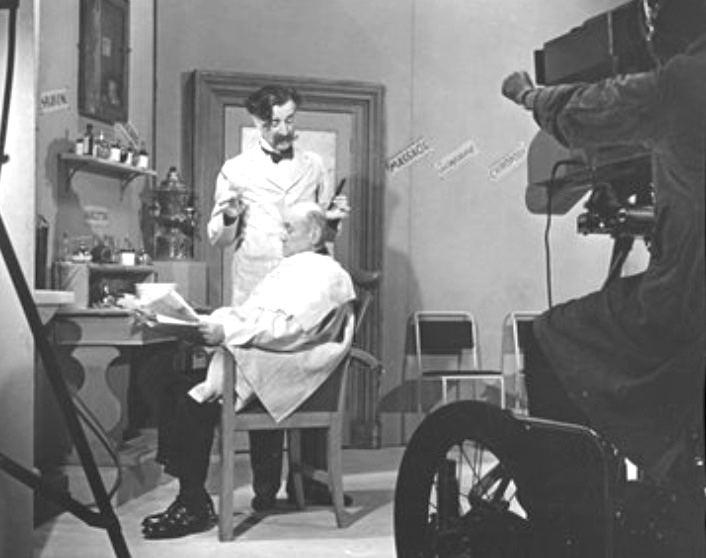OTD in early British television: 24 March 1939

John Wyver writes: Almost all pre-war television comedy came courtesy of funny men in variety bills, or in dramas taken over from the theatre. But there is one pre-war original series that points the way to the future of television humour.
In the Barber’s Chair, ‘a sketch by Reginald Arkell’, was given an 11-minute slot in early March 1939, with a second episode that had its second outing on the afternoon of Friday 24 March. Born in 1881, Arkell was a comic novelist who also wrote many musical plays for the London theatre, including an adaptation of the spoof history book 1066 and All That: 1066—and all that: A Musical Comedy based on that Memorable History by Sellar and Yeatman.
Playing with a silent customer as stooge (Harry Atkinson), Charles Heslop, an older comic actor and already a television regular, embodied the talkative Percy Ponsonby. In this second episode Ponsonby had plenty of opinions about that week’s budget, and the character settled into a semi-regular slot beyond his barbershop, although still in the studio, taking a train ride, visiting Lord’s for a Test Match, and packing for a holiday.
In April, ‘E.H.R.’ was far from satisfied with the series, although some what eccentrically he knew how to fix things (even if he got the character’s name wrong):
Reginald Arkell is one of the best of our humorous writers. Charles Heslop is a clever comedian. Both have considerable experience of the special needs of the home screen. Why, then, is In the Barber’s Chair… not funny at all?
It should be uproarious. Probably these scenes do not get across because ‘Peter Ponsonby’ (sic) is obviously intent on talking and not on attending to the victim he has in the chair.
We who sit in a barber’s chair at regular intervals just want to kill Ponsonby. But put him by his fireside discoursing of life and his customers to his wife and he would be a scream. The matter is there. It is the method that is at fault.
More enthusiastic than this opinion, Radio Times suggested that the series was firmly in the tradition of character-based radio comedy, which television to that point had not exploited at all. More importantly, director of television Gerald Cock and his colleagues recognised the potential, and in the ten Ponsonby broadcasts it is far from fanciful to see the beginning of television situation comedy.
Leave a Reply